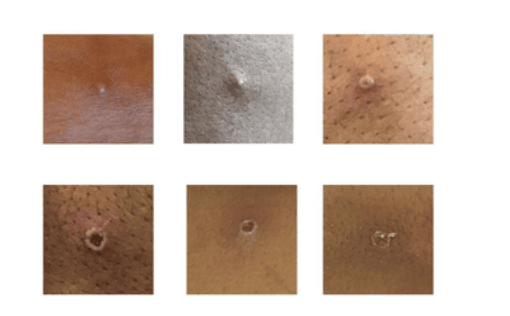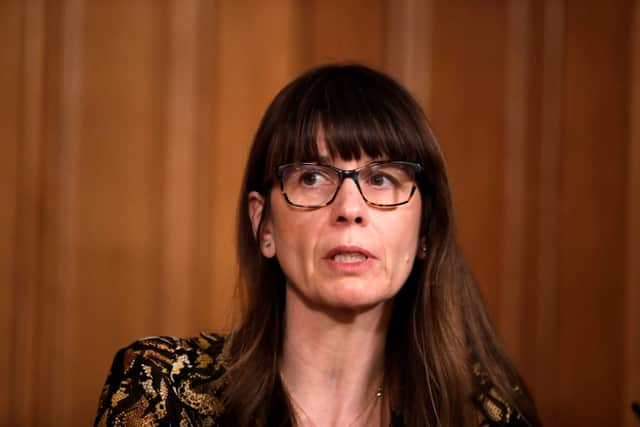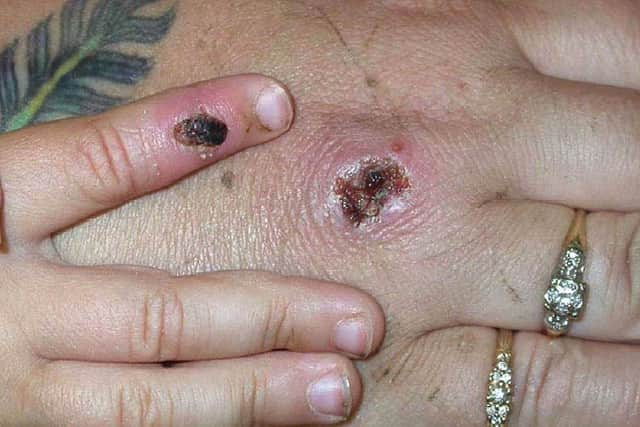Monkeypox virus: Young child in intensive care in London hospital with the disease
and live on Freeview channel 276
A child is in intensive care at a London hospital after they were diagnosed with the monkeypox virus, reports say.
This comes as new monkeypox figures, due to be published on Monday afternoon, are expected to show a significant rise in the number of confirmed cases in the UK, currently at 20.


Advertisement
Hide AdAdvertisement
Hide AdNo further details about the new patients have been released but according to the Sunday Telegraph, a young child is among those currently being treated.
New guidance from the UKHSA recommends people who have had "unprotected direct contact or high-risk environmental contact" with the disease should isolate for 21 days.
LondonWorld understands this either means skin contact without wearing PPE or spending time together inside and touching the same items.
People with monkeypox should also avoid contact with immunosuppressed people, pregnant women, and children under 12.
Advertisement
Hide AdAdvertisement
Hide AdThose who are considered at high risk of having caught monkeypox may have had household contact, sexual contact, or have changed an infected person’s bedding without wearing appropriate PPE.
UKHSA also advises that they are offered a smallpox vaccine.
A notable proportion of early cases detected have been in gay and bisexual men and so UKHSA is urging this community in particular to be alert.
The first case was confirmed in the UK on May 7. They had recently travelled to Nigeria, which is where they are believed to have contracted the infection, before travelling to the UK.


What are experts saying?
Advertisement
Hide AdAdvertisement
Hide AdDr Susan Hopkins, chief medical adviser, UKHSA, said: “We anticipated that further cases would be detected through our active case finding with NHS services and heightened vigilance among healthcare professionals.
“We expect this increase to continue in the coming days and for more cases to be identified in the wider community.
“Alongside this we are receiving reports of further cases being identified in other countries globally.
“We continue to rapidly investigate the source of these infections and raise awareness among healthcare professionals.
Advertisement
Hide AdAdvertisement
Hide Ad“We are contacting any identified close contacts of the cases to provide health information and advice.
“Because the virus spreads through close contact, we are urging everyone to be aware of any unusual rashes or lesions and to contact NHS 111 or a sexual health service if they have any concerns.
“Please contact clinics ahead of your visit and avoid close contact with others until you have been seen by a clinician.
“A notable proportion of recent cases in the UK and Europe have been found in gay and bisexual men so we are particularly encouraging them to be alert to the symptoms and seek help if concerned.
Advertisement
Hide AdAdvertisement
Hide Ad“Clinicians should be alert to any individual presenting with unusual rashes without a clear alternative diagnosis and should contact specialist services for advice.”


What is monkeypox?
Monkeypox can be caught from infected wild animals in parts of west and central Africa.
It’s thought to be spread by rodents, such as rats, mice and squirrels.
You can catch monkeypox from an infected animal if you’re bitten or you touch its blood, body fluids, spots, blisters or scabs.
Advertisement
Hide AdAdvertisement
Hide AdIt may also be possible to catch monkeypox by eating meat from an infected animal that has not been cooked thoroughly, or by touching other products from infected animals
According to the NHS, it’s very uncommon to get monkeypox from a person with the infection because it does not spread easily between people.
But it can be spread through: touching clothing, bedding or towels used by someone with the monkeypox rash, touching monkeypox skin blisters or scabs, or through the coughs or sneezes of a person with the monkeypox rash.
Early symptoms of monkeypox include fever, headache, muscle aches, backache, swollen lymph nodes, chills and exhaustion.
Advertisement
Hide AdAdvertisement
Hide AdA rash can also develop, usually starting on the face before spreading to other areas of the body.
The rash progresses through different states until it forms a scab which falls off.
Symptoms usually clear up within two to four weeks.
You should contact your GP or call 111 if:
You have a rash with blisters and either:
- You’ve returned from west or central Africa in the last 3 weeks.
- You’ve been in close contact with someone who has monkeypox in the last 3 weeks.
NHS says to make sure you tell the person you speak to if you’ve recently travelled to central or west Africa, or have had close contact with someone who has monkeypox.
Advice is to stay at home and avoid close contact with other people until you’ve been told what to do or if you’re still abroad, try to get medical help where you are as soon as possible.
Comment Guidelines
National World encourages reader discussion on our stories. User feedback, insights and back-and-forth exchanges add a rich layer of context to reporting. Please review our Community Guidelines before commenting.
